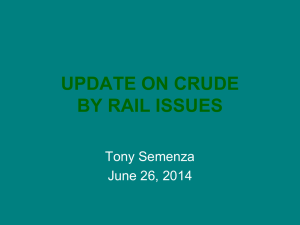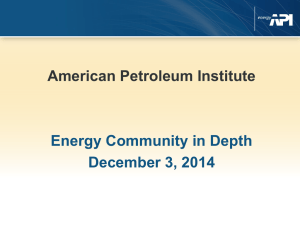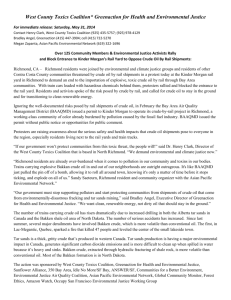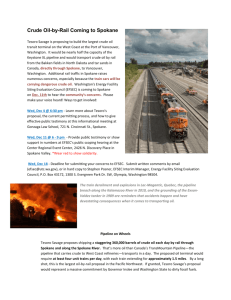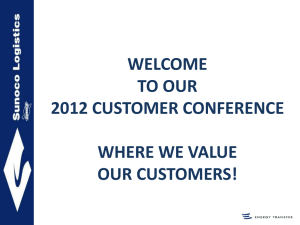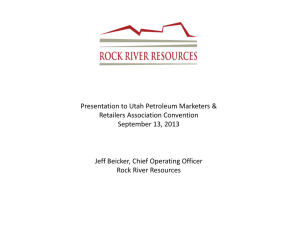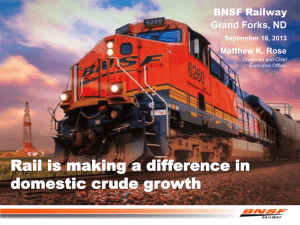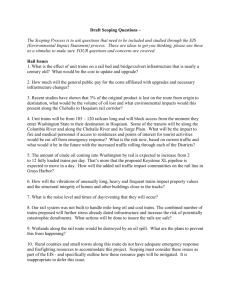Bakken Crude Oil Rail Transport: Market Analysis
advertisement
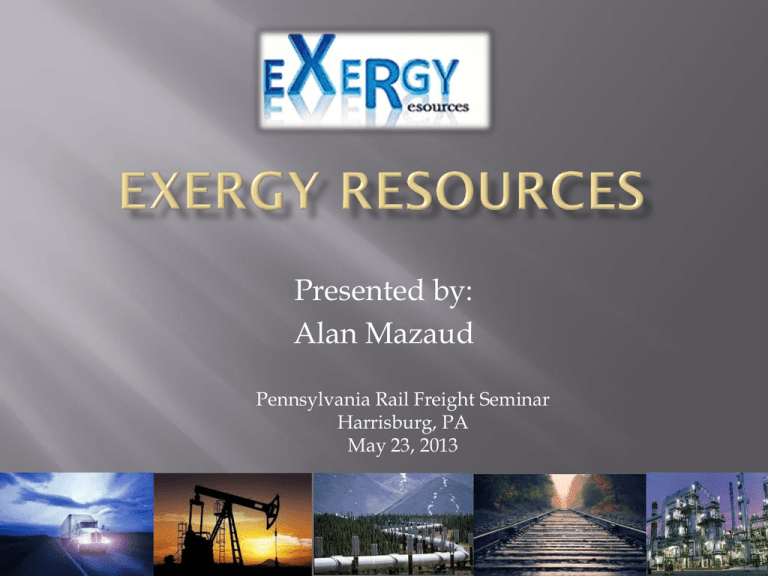
Presented by: Alan Mazaud Pennsylvania Rail Freight Seminar Harrisburg, PA May 23, 2013 Firm background and activity US crude oil production status Areas of shale activity Bakken rail opportunity WTI/Brent spread and its effect on crude by rail business model Key takeaways A crude marketing firm based in New York City with an office in North Dakota Firm originated from private equity and became independent in 2012 Backed by private equity and family offices Will purchase for its own book and take title as well as on behalf of third parties Focus on Bakken, Canada, USGC Transport via pipeline, rail and truck Shares of total U.S. energy History 2000 24% 2011 Natural gas 8% 8% 23% 1% 20% Source: EIA, Annual Energy Outlook 2013 Early Release 28% 26% 6% 8% 39% Projections 36% Renewables (excluding liquid biofuels) Nuclear Liquid biofuels Coal Oil and other liquids 11% 9% 2% 19% 32% 4 3 net product exporter 2 exports 1 0 -1 net exports -2 imports -3 -4 1949 1955 1961 1967 Source: EIA, Petroleum Supply Monthly 1973 1979 1985 1991 1997 2003 2009 2011 History Projections STEO Feb. 2013 U.S. crude oil projection 8 6 Tight oil 4 Other lower 48 onshore 2 Alaska 0 1990 1995 2000 Lower 48 offshore 2005 2010 2015 2020 2025 2030 Source: EIA, Annual Energy Outlook 2013 Early Release and Short-Term Energy Outlook, February 2013 2035 2040 Source: Preliminary International Energy Outlook 2013, BP Energy Outlook 2030 Source: Drilling Info (formerly HPDI), Texas RRC, North Dakota department of mineral resources, and EIA, through October 2012. Permian Basin (Bonespring, Spraberry) has production of 1.3MM b/d as of Q1 2013 Pipeline projects for Permian basin to USGC Projections for 2016 are 1.9MM b/d By mid 2014 1.365MM b/d of capacity Eagle Ford Current production at 700M – 800M b/d Est for future production: 1.6MM b/d by end of 2016 Total capacity of pipeline projects outpaces expected production by around 200M-400M b/d The success of these shale plays could force Bakken crude to move solely to the east and west coasts Source: Platts, Turner Mason • ODNR released report last month on 2012 production • 87 wells • 1,750 b/d of oil • 35 MM cf/d of gas • Considered disappointing • To date, 660 shale well permits, 326 have been drilled and only 97 in production • Producers waiting on infrastructure (takeaway and processing capacity) Source: Halcon Resources Presentation, RBN Energy Current production estimates are 800M b/d range 2013 U.S. Geological Survey estimates undiscovered volumes of 7.4 Bn barrels of oil vs 3.65 Bn barrels from 2008 survey Beware the decline curve Current Rail takeaway capacity is at 730M b/d taken from 22 terminals Only 72,000 b/d went to US East coast in Dec ‘12 Will grow to 175k-235k at end of 2013 64% of crude traveled via rail, 27% via pipeline Source: Platts, Turner Mason, Bentek, North Dakota Pipeline Authority Rail deals on East Coast: P66 announced a 5 yr contract to move 50M bpd crude by rail to Bayway, NJ facility (CSX/NS) PBF Energy in Delaware City can handle 40M b/d of heavy and 70M b/d of light via rail (NS) Source: Platts, Turner Mason, Bentek Source: RBN Energy Source: RBN Energy Source: CME data from Morningstar • Bakken producers’ netback directly affected by spread compared to cost of transportation • Pricing will depend on the availability of a pipeline alternative • Bakken production will first look to move to the Gulf via pipeline • Increase in production vs increase in pipeline capacity Source: RBN Energy, EIA Bakken and other shale crudes have nowhere else to go Bottleneck and glut leads to decline in price Prior to the Seaway reversal, Exxon’s Pegasus pipeline was the only route to clear the Midwest As more pipelines come online, bottleneck is removed, increasing demand for this crude Movements in spread haven’t matched changes at Cushing • Other influences of crude price: • Midwest refinery demand • Production from Texas • Will Seaway ship light or heavy crude • Glut in the Gulf • Exports??? Source: CME data, RBE 60000 50000 40000 30000 20000 10000 0 Source: EIA Barrel Total at Cushing In the short term difficult to say how the spreads will look Longer term, price spreads will match cost of transportation to market Production will need to Watch production growth, decline curves as production will need to match or exceed growth in pipeline capacity If spreads remain low, inland crudes that are more reliant on rail to get to market will increasingly trade at a discount to WTI At start of May Bakken crude was $1 below WTI, mid May -$4 Aside from pricing, relationships and customer service are key! Alan Mazaud Exergy Resources LLC Phone: (212) 686-0073 Email: alanm@exrllc.com
